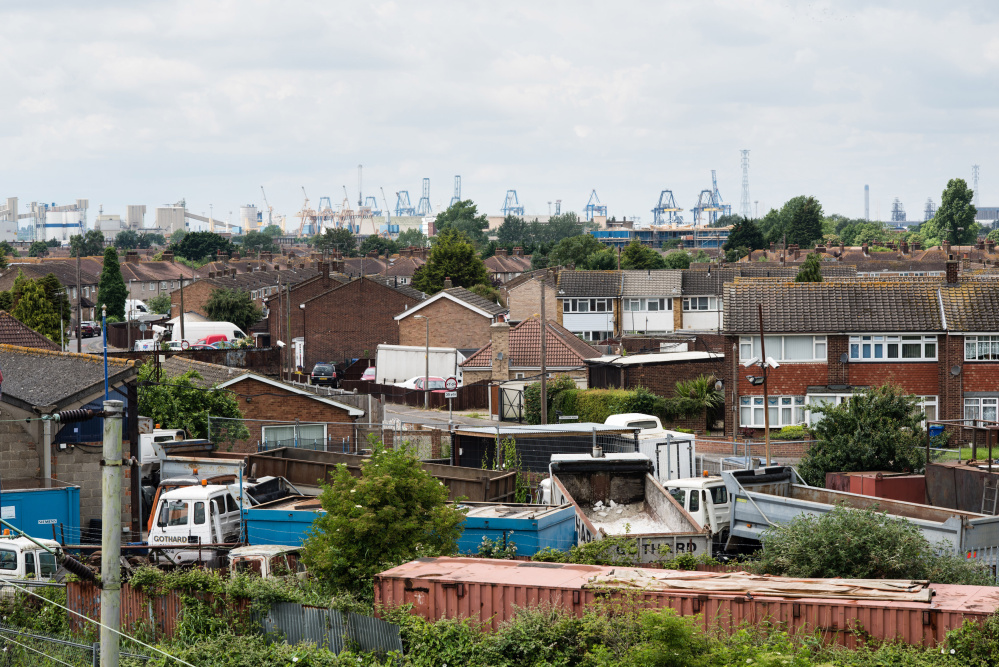TILBURY, England — On June 23, 2016, the port town of Tilbury in southeastern England sent a clear message to the world when more than 72 percent of voters here and in surrounding Thurrock voted for Britain to leave the European Union. Few other towns in the country voted more decisively in favor of what has become known as Brexit.
But one year on, the cautious hope for a more prosperous future has largely been displaced by confusion, anger and resignation. Whereas some here fear that Brexit will stall or could be watered down, others wonder whether the government’s focus on leaving the EU is suppressing other concerns and issues. Here, Brexit – a term which used to be the rallying cry for Britons’ anger at the European Union – has become a synonym for the increasingly chaotic state of British politics.
There still is significant support in Britain for leaving the EU, and few in Tilbury said they had regrets over their vote last year. But in a city which once seemed mostly united on the matter, there was a growing acknowledgment that at least some of the arguments which led to last year’s surprise decision might have been flawed.
“It’s all just a mess,” said 30-year old Kayleh who works in a local store. She and others did not want to provide their last names over fears that their comments could have a negative impact on future job applications. Half of Kayleh’s family voted to leave the EU last year, but doubts are mounting, she said.
“Of course, we don’t want to kick the Europeans out of our country. All I want is better schools,” she added, while standing next to her German relative, 33-year old Caroline Thompson who was visiting her husband’s family in Tilbury.
“They now realize that they made a mistake when they voted to leave last year,” said Thompson, referring to her husband’s family.
Instead of being able to focus on improving schools or the country’s strained health care system, the British government is almost completely occupied with the two-year long Brexit negotiations which could still turn into a political and economic nightmare, and have only just begun.
“It’s as if we voted for a black hole,” said 25-year old Aisha Joozooph, who sat in the office of a community trust which supports locals with concerns ranging from citizenship applications to job search. As a volunteer with the initiative, Joozooph also discusses Brexit concerns with community members.
Like her entire family and many of those she now advises, Joozooph herself voted to leave the EU last year. “We thought there was a plan in place – but there wasn’t. There are so many other issues that would require attention, but now everyone is just focused on Brexit,” said Joozooph.
PURSUING A LESS RADICAL DEPARTURE
For some time following the referendum, Theresa May attempted to avoid such a scenario. In her first speech as prime minister last July, she said she would prioritize “not the mighty nor the wealthy nor the privileged,” but rather fight the “burning inequality” in the country. May wanted to tackle the underlying concerns which led to the E.U. exit vote, rather than simply deal with its symptoms, it appeared.
Now 11 months and one devastating general election later, May is facing a backlash for her policies which some say represent the opposite of what she had initially promised.
The criticism of May has also realigned British politics. One year ago, the country was mostly divided between those in favor of staying in the EU and those who wanted to leave. But there is now a third group somewhere in the middle which wants to find a compromise. After 12 months of mostly bad news on the state of Brexit, Britain may not be ready to abandon the project – but is it ready to move on and try to find common ground?
Many younger voters now believe that if they cannot stop Brexit, they should at least attempt to soften it. Despite a record youth voter turnout in the general elections earlier in June, few supported the only party willing to stop the exit from the EU, the Liberal Democrats. Instead, many former Remain-voters opted for the Labour Party which has stated that it wants to pursue a less radical departure from the continent.
ONE OF ENGLAND’S POOREST PLACES
On the other side of the political spectrum, there are also indications that support for the harsh Brexit May has so far pursued is in decline. Having focused almost entirely on her vision for a clear cut exit from the EU, her Conservative Party surprisingly lost the parliamentary majority in June and now relies on the support of Northern Ireland’s Democratic Unionist Party. Under pressure from the Brexit supporters in her own party, May has so far refused to give into demands by her opponents to soften her approach.
But it is a strategy which could easily go wrong, as Tilbury indicates. In the general elections, the party which gained most votes here was Labour, even though the Conservatives narrowly defended their lead.
Despite a relatively high density of college graduates and skilled workers in the area, the town of 12,000 remains one of England’s poorest places. Little here has changed since last June. A former guesthouse in the town’s center is still plastered with advertisements for instant cash loans, and many stores on the main street remain shuttered.
‘THE VOTE WILL AFFECT MANY JOBS’
In the distance, the sound of containers being loaded onto ships could be heard. Many here in Tilbury work in professions such as car manufacturers which rely on trade deals with Europe – deals that are now at stake. It is the irony of Brexit that it found most supporters in areas which depend most heavily on continental trade and EU subsidies.
“The vote will affect many jobs in Tilbury, given that we trade so much with the EU from our port here,” said one woman working with a Tilbury-based shipping company.
Others remained staunchly in favor of leaving the EU but said they had little hope that their vision would be fully implemented. “I hope it happens, but the government will end up softening Brexit, anyway,” said 53-year old health care worker Cheryl.
Despite continued support for Brexit among parts of the town, the EU has lost much of the ugliness in which it was being portrayed here during the referendum campaign. Some former Brexit sympathizers now even feel comfortable viewing other member states as role models.
“In Germany, you can get a doctor’s appointment almost instantly,” said 32-year old Louise Thompson. “Here, it takes three weeks to see someone. You’re dead by the time it’s your turn.”
And there is a growing sense in Tilbury that leaving the EU alone won’t change that.
Send questions/comments to the editors.




Success. Please wait for the page to reload. If the page does not reload within 5 seconds, please refresh the page.
Enter your email and password to access comments.
Hi, to comment on stories you must . This profile is in addition to your subscription and website login.
Already have a commenting profile? .
Invalid username/password.
Please check your email to confirm and complete your registration.
Only subscribers are eligible to post comments. Please subscribe or login first for digital access. Here’s why.
Use the form below to reset your password. When you've submitted your account email, we will send an email with a reset code.